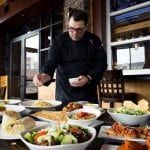At ezCater, we’re dedicated to helping restaurants grow a successful catering business. That’s why we’re excited to share this video series featuring insights and lessons from industry experts behind thriving catering programs.
When customers dig into catered treats like frozen yogurt at their meetings, they probably don’t stop to think about how the experience has been put together. But a lot of work goes into executing a great brand experience. That’s why we asked Kendall Ware, President and Chief Operating Officer of Orange Leaf, to share his advice on how brands can successfully put their catering strategy into play. In this video, we’ll cover ways to pull off an awesome experience through branding and redesigning your standard operating procedures (SOPs) and training programs specifically for catering. Check out our video with Kendall.
Kendall Ware is President and Chief Operating Officer of Orange Leaf, where he oversees strategic development, operational execution, and brand growth. He has over a decade of franchise leadership experience and formerly served as Director of Training and Development for Cicis (formerly CiCi’s Pizza).
Want help in creating a great catering experience?
TRANSCRIPT
Kendall Ware: My name is Kendall Ware. I’m the President and Chief Operating Officer (COO) of Orange Leaf Frozen Yogurt and Humble Donut Co. I’m here with ezCater today to talk about treat brands.
ezCater: How do you reflect your brand promise off-premises?
Kendall Ware: To make sure that the guest and the consumer have a similar experience, we had to make sure that we bring more than just one item. Most guests are used to that self-serve frozen yogurt experience. And so how do you [deliver] something very similar to them [off-premises]? Something that we invested in that we have nationwide is something called a “Pop-Up Party Box.” And it’s basically our catering vehicle. But it comes with, you know, unlimited fro-yo flavors, toppings, a whole setup so that guests can have that same, you know, build-your-own experience, but in their office or in their homes.
ezCater: How do you make sure ideas, like your party box, are scalable and optimized for your operations?
Kendall Ware: So we had to create something simple, right? Obviously, when you come up with an idea like this, there are so many big ideas and thoughts and different ways to accomplish it, but they become more operationally complex, more labor-intensive. And so we just wanted something very simple that still maintained the brand’s consistency, but that could travel [well] and be brought anywhere by anybody. And so we created that [pop-up party] box with the mentality of saying, “Hey, how simple is this? Could anybody put it together? Could anybody go in and put this into an event or a party and set it up appropriately?” And the answer was yes. So a lot of thought and testing went into this, this pop-up party box, to make sure that it could be accomplished.
ezCater: What standard operating procedures (SOPs) did you implement for your catering program?
Kendall Ware: So a lot of SOPs had to be implemented because, again, now you’re handling a product in a way that you’ve never handled it before. And so you can’t, you know, grab frozen yogurt out of a machine and just go deliver it; you have to now come up with a freezing process, a thawing process, the exact timing of how early you have to start pouring out the smoothies or the flavors, etc. So a lot of educational knowledge had to be adopted, especially on the food-safety side because now it’s not as simple as it used to be. But the reward is so much higher that people are willing to buy into it and learn what they need to learn to start opening the doors to cater more often.
ezCater: What type of training do you need to put in place to execute those SOPs?
Kendall Ware: We focus heavily on the online learning side of things. And so anything that we do, any new operational changes, we make sure that we create short, bite-sized training videos that are designed for team members, managers, and our strategic partners or franchisees. So we start there. We start by making sure that we have one voice communicating any changes or standards. That way it’s consistent. And then we focus on the follow-up. And so from there, we have our team that goes out there and makes sure that we’re actually adopting and implementing those changes. But we do, you know, we rely heavily on the online learning aspect through an app called reMarkable that we have internally, where basically it’s about the training, the learning.
ezCater: Why is training vital to your business?
Kendall Ware: The training is the foundation of anything that you do, in any business. And far too often, training is perceived as a cost center versus a profit center. And so we definitely have shifted that mentality to make sure people realize the value that comes out of training. And so it’s something we invest in heavily.
So, you know, first, we start off with the online learning videos. We had to make sure that you have that one consistent voice speaking to all people in the exact same way, right? You’ve got to have that consistency. From there, we do have follow-up sessions, where we go out into the field and we essentially have field-training workshops, where you have that shoulder-to-shoulder, peer-to-peer—you have everybody in one room, where you can still talk about what they learned online and then actually practice it in real life, right? Now you’re actually making the products that we read about or took a test on, and so on, and so forth. But you have somebody from the support center there by your side, who is truly showing you everything you already learned in the video, but who is now validating that experience.
ezCater: How does effective training impact the experience of your catering customers?
Kendall Ware: That’s what makes or breaks the catering experience. You have to have the training in place to make sure that all team members—all managers, anybody involved with making that product and responsible for delivering that experience—understand what it takes to take that great product you have in the store that, you know, the guests know you for, but now you’re going to take it out of the store. So there’s got to be a lot of training and very tight standards in place to make sure that you have figured out the perfect way to maintain that quality.
So, you know, today, currently, whether that’s catering, whether that’s mobile delivery, you are taking your experience now out of the building. And the challenge with that is you don’t have, you know, trained and certified people—people who are responsible [for the delivery order] and aware of what they should be delivering, how they should be welcoming and greeting guests, and how they should handle or display certain products. And so we focus on how do we educate as many people involved—whether that’s our catering partnerships and mobile delivery partners—but how do we educate people on what our standards are, even if it’s the slightest touch toward where the guests feel like, “This [experience] is just like how I get it when I’m in store.”
ezCater: What new roles are crucial to executing SOPs?
Kendall Ware: You have to create that strategic plan to where you’re saying, “Here’s what I’m doing for the business.” And it was something that was created and collaborated upon by all stakeholders in that business. And once that’s defined, you have to make sure that you have the right roles and support in place to accomplish that plan. And so every year, you know, I focus on shifting some roles around or even creating new roles to make sure that we have the right support structure for that plan. You have to have a designated role or a member focused on catering solely. Otherwise [the work] just doesn’t get done.
ezCater: How do you ensure your catering menu is profitable?
Kendall Ware: Well, first and foremost, you have to have more [menu offers] available to the guest. And so something we did last year, we actually launched smoothies and shakes nationwide to make sure that we open up that door. Now, there are different treats but also different dayparts that are now available for the consumer. But we looked at that. And we also started looking at other smaller add-on products like cookies to have more to add to that check. And so by adding all these other products, it really started to increase that average check. And people started using the online services or catering more often because there was more to bring to their event.
ezCater: How do you ensure quality for off-premises orders?
Kendall Ware: First and foremost, we had to make sure that we uphold the company’s standards no matter where that product is going. So our standards had to be maintained. And we had to have our core product’s quality be as high as it is when it shows up at the doorstep and/or at the office or wherever it goes, as it would in the store. And so a lot of focus went into the timing of this whole aspect. With a treat that could potentially melt, we had to do a lot of testing—from how long it takes for that product to be, you know, prepared; and then how long does it have before it starts to melt, or starts to, you know, lessen in quality. And so we did a lot of tests in terms of how long we can drive with it, how long we had to freeze it prior—exactly how many minutes, depending upon how far we’re thinking the order is going to go. And so we know that there’s a set amount of time frame needed for the product to sit in a frozen state, prior to being delivered on a 20-minute drive, 30-minute drive, hour-long drive, etc.
ezCater: How do you deliver your brand experience flawlessly off-premises?
Kendall Ware: As a leader of any treat brand, you have to make sure your operational standards are in place and they’re very, very tight and they protect your brand. Guests have to, again, experience the same product in the store, same as they do out of the store.
So each individual product should have its own checklist to understand how it needs to be maintained in the catering process, but also what all should be delivered with it. Frozen yogurt, for example, is very delicate. We had to ensure that it does not melt. And so we had to, you know, make sure people are upholding the standards of how long we have to, you know, flash-freeze it, technically, prior to delivering it—or how much time they need to prepare the product, anticipating the order and/or the pickup window and/or the delivery, to make sure that it’s going to be in that normal, creamy state by the time it arrives at the event. We provide all the training, all the guidance, all the support and resources you need to accomplish a successful catering order. But at the end of the day, it comes down to store-level execution. And any business owners involved, any managers involved, have to ensure that they’re focusing on executing at the store level and they’re taking all those resources and actually applying them to that catering order.
ezCater: How do you support franchisees so that their catering business is successful?
Kendall Ware: As we embarked down this catering journey, we wanted to ensure that our franchisees were set up for success. And so we implemented three different equipment packages—basically, beginner, intermediate, and advance—to reach all levels of catering. And so for those who were just getting started and getting into the weeds, a little bit, of catering, we have that beginner package, where it’s all the essentials you need to deliver frozen yogurt, smoothies, mini donuts, etc. Then we move into that intermediate package. That’s when we start getting into weddings and a little bit larger events, you know, big office parties, things like that. And then we have the advance [package], where essentially you’re talking about rolling in mini carts, you’re having more non-traditional units built up for an event and/or a certain period of time for maybe a sports game, something along those lines. But we have all those different equipment packages available and it’s up to the partner to choose which one they want to go after depending upon the opportunities they have at hand.
The reason why we put those other packages in place was to be there to support our franchisees as our catering business grows. And so as they start to scale catering in their communities, we want to make sure that we have the right support structure in place, where they continue to grow to the point where nobody has to say no to any event that they get.







